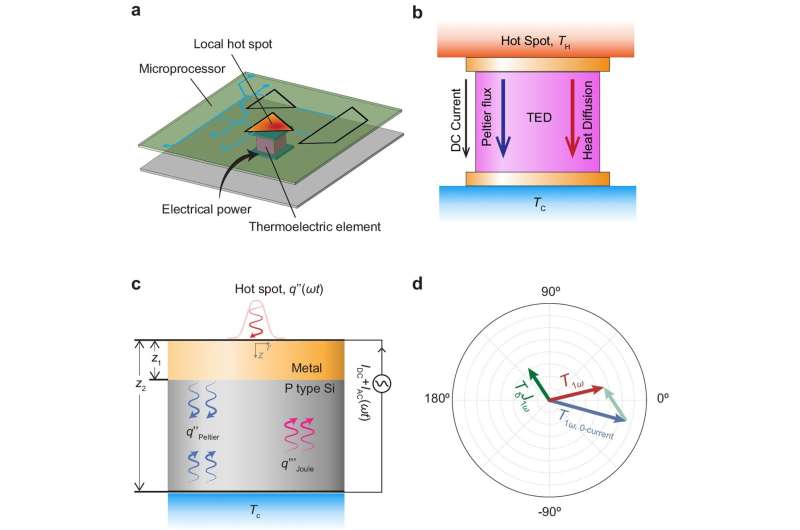Thermoelectric devices may solve overheating issues in shrinking transistors, researchers say
The electronics industry faces a new challenge. While transistors in computer chips are shrinking, the heat they produce is only increasing. Overheating can cause reduced circuit performance, increased leakage power or even the total breakdown of transistors.
A team of researchers from the University of Pittsburgh and Carnegie Mellon University propose locally embedded thermoelectric devices (TEDs) that can perform active cooling inside circuits. The research is published in the journal Nature Communications.
“Circuits like clock generators and arithmetic and logic units (ALU) create high-frequency heat fluxes with their peak hot spots occurring on the microprofessor,” explained Feng Xiong, associate professor of electrical and computer engineering at Pitt’s Swanson School of Engineering. “Cooling systems at the chip size are over designed and a more targeted strategy is necessary to dissipate heat in these hot spots.”
TED finds the hot spot
The only way to cool an object down is to remove the heat—or energy—from it. These circuits are generating heat at a really high frequency. With TED, this high frequency temperature variation can be totally eliminated.
TEDs remove heat from hot spots inside circuits to colder regions throughout the device using thermoelectric effects at the same frequency. Researchers proved their theory using experimental data from frequency domain thermal reflectance (FDTR) measurements made directly on an actively cooled thermoelectric device where the pump laser replicates the transient hot spot. The team used materials with high thermal conductivity, which theoretically improves cooling efficiency by a factor of 100 compared to conventional thermoelectric materials.
“We demonstrated a practical method to actively cancel the transient temperature variations on circuit elements with TEDs,” Feng said. “This result opens a new path to optimize the design of cooling systems for transient localized hot spots in integrated circuits.”
More information:
Yihan Liu et al, Thermoelectric active cooling for transient hot spots in microprocessors, Nature Communications (2024). DOI: 10.1038/s41467-024-48583-9
University of Pittsburgh
Citation:
Thermoelectric devices may solve overheating issues in shrinking transistors, researchers say (2024, June 12)
retrieved 13 June 2024
from https://techxplore.com/news/2024-06-thermoelectric-devices-overheating-issues-transistors.html
This document is subject to copyright. Apart from any fair dealing for the purpose of private study or research, no
part may be reproduced without the written permission. The content is provided for information purposes only.

Comments are closed